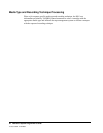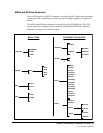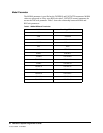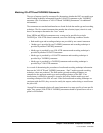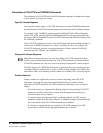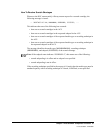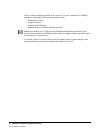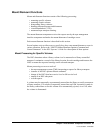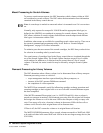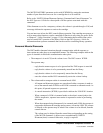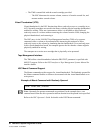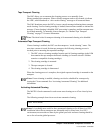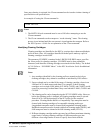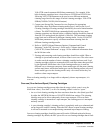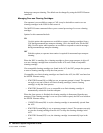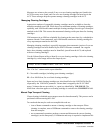
34 VM/HSC 6.0 System Programmer’s Guide
1st ed., 6/30/04 - 312579601
Mount Processing for Scratch Volumes
To process scratch mount requests, the HSC determines which volumes within an LSM
are considered as scratch volumes. The HSC makes the determination from information
contained in the library control data set.
Note: A scratch tape is marked as nonscratch when it is mounted even if it is not written
on.
Normally, only requests for nonspecific VOLSERs and the appropriate label type (as
defined in the LIBGEN) are considered as requests for scratch volumes. However, the
HSC allows selection of scratch volumes from different scratch subpools and different
label types via interaction with the TMI.
In addition, other means are available for controlling scratch volume activity. These are at
the operator command and programmer utility levels. Refer to “Scratch Subpool
Management” on page 39 for more information.
To minimize pass-thru movement of the scratch cartridges, the HSC always orders drives
for selection in ascending order by scratch count.
The scratch status of cartridges listed in the library control data set is updated through the
use of the Scratch Update utility. The Scratch Update function accepts a list of volume
serial numbers for addition to, or deletion from the control data set’s list of scratch
volumes. If desired, the entire scratch list may be deleted by using the Scratch Update
utility.
Dismount Processing for Library Volumes
The HSC determines when a library volume is to be dismounted from a library transport.
Dismount processing occurs as a result of:
• a tape management interface request identifying library transports, or
• issuance of the HSC operator DISMount command
• the completion of a clean operation.
The MNTD Float command is useful for influencing cartridge exchange operations and
returning cartridges to their original cells or to new cells after a mount/dismount request
has been completed.
If the MNTD command Float option is on (i.e., MNTD Float(ON)), when a volume is
passed to a transport in another LSM, dismount processing frees the original cell location
and assigns the volume to a cell in the same LSM as the transport as long as empty cells
exist. If no empty cells exist, a location is chosen in the nearest LSM with free cells or
volumes can be forced to their original home cell at dismount time.
If Float is off, the HSC returns the volume to its original home cell location.
The MNTD SCRDISM parameter allows scratch volumes mounted in a WolfCreek LSM
to be archived either in the same WolfCreek LSM or in the next largest storage device (the
9310 LSM).



